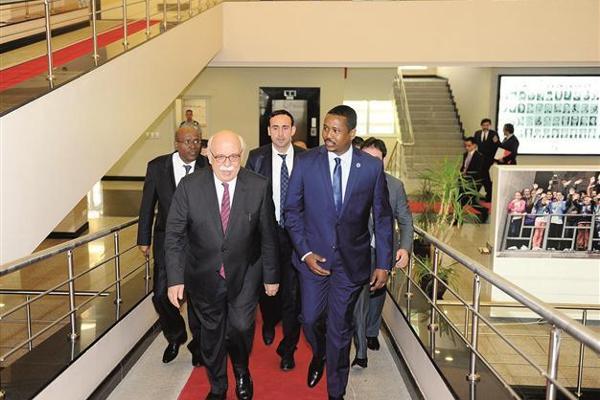Minister downplays 'chaos' in education after students were placed in wrong schools
ANKARA


Turkey’s Minister of National Education, Nabi Avcı (L), welcomes his counterpart from Djibouti in Ankara. Minister Avcı plays down the worry of chaos after the results for the nationwide TEOG exams were announced. AA photo
Turkey’s education minister has sought to downplay the catastrophic ongoing situation in Turkey’s secondary education system, after a large number of students were controversially placed in incorrect high schools following the recent central exam. Much of the controversy surrounds the “imam-hatip” Islamic vocational high schools, with reports suggesting that 40,000 students, including non-Muslims, have been placed in such schools for the upcoming school year against the will of their families.In response to the controversy, Education Minister Nabi Avcı has indirectly pointed to private schools as the formula to solve the problems that have emerged in the system.
“As of this week, there have been some troubles in quotas. There are understandable reasons for this situation because the transition to private schools hadn’t yet begun. That’s why the sufficient quota gaps in [public] schools hadn’t previously emerged. Since the transition to private schools began this week, new quotas are emerging in our public schools. According to the latest information I have received, this quota currently approaches 15,000 and will continue to grow next week,” said Avcı on Aug. 29.
He also said, however, that those who were unable to secure a place in one of the 15 choices that they made before entering the nationwide primary to secondary education exam (TEOG) were placed in other schools in line with their choices.
“Our parents shouldn’t rush. The applications for transfer [from assigned schools] will begin from Monday [Sept. 1]. We are aware that we have created a little bit difficulty for them but the system is settling down,” Avcı added.
Some 1.3 million students are set to graduate from secondary schools and begin in high schools, 93 percent of whom have already been placed in one of the 15 choices they originally listed, Avcı also said.
Earlier this week, Education Ministry Deputy Undersecretary Muhterem Kurt confirmed that a total of 9,802 students had been placed in schools far away from the districts where they live, but stressed that there was “no need to panic.”
Avcı echoed Kurt, underlining that those students who have been placed in schools far away from where they live will be able to appeal to fill the vacant quota in other schools and they have time to do this until the end of September.
“God willing, we will have all of these problems resolved by the end of September,” he said, stressing that a “huge effort” was underway.
According to the new system, students failing to get into their top-preferred school as a result of the exam are placed in schools nearest to their area. However, many claim that too many regular schools have been turned into imam-hatip schools in recent years, making it difficult for some children to avoid a religion-focused education even if they do not want it.
Others claim that the government is actually aiming to promote private schools, with some parents expected to choose to force their budget in order to send their children to private schools rather than leave them in state schools they have been mistakenly placed in.
